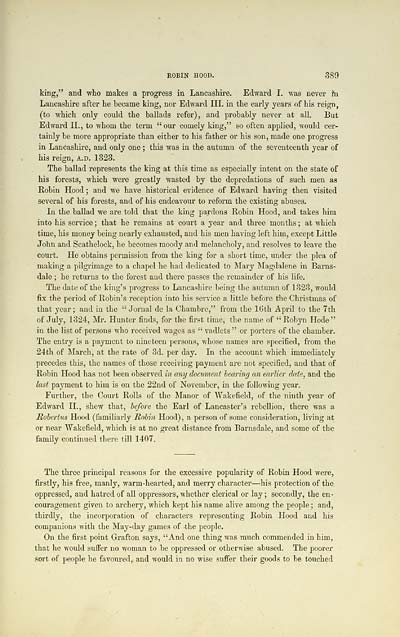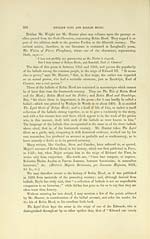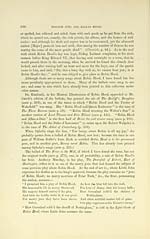Glen Collection of printed music > Printed text > Popular music of the olden time > Volume 2
(13) Page 389
Download files
Complete book:
Individual page:
Thumbnail gallery: Grid view | List view

ROBIN HOOD. 389
king," and who makes a pi'ogress in Lancashire. Edward I. was never m
Lancashire after he became king, nor Edward III. in the early years of his reign,
(to which only could the ballads refer), and probably never at all. But
Edward II., to whom the term " our comely king," so often applied, would cer-
tainly be more appropriate than either to his father or his son, made one progress
in Lancashire, and only one ; this was in the autumn of the seventeenth year of
his reign, a.d. 1323.
The ballad represents the king at this time as especially intent on the state of
his forests, which were greatly wasted by the depredations of such men as
Robin Hood ; and we have historical evidence of Edward having then visited
several of his forests, and of his endeavour to reform the existing abuses.
In the ballad we are told that the king pardons Robin Hood, and takes him
into his service ; that he remains at court a year and three months ; at which
time, his money being nearly exhausted, and his men having left him, except Little
John and Scathelock, he becomes moody and melancholy, and resolves to leave the
court. He obtains permission from the king for a short time, under the plea of
making a pilgrimage to a chapel he had dedicated to Mary Magdalene in Barns-
dale ; he returns to the forest and there passes the remainder of his life.
The date of the king's progress to Lancashire being the autumn of 1323, would
fix the period of Robin's reception into his service a little before the Christmas of
that year ; and in the " Jornal cle la Chambre," from the 16th April to the 7th
of July, 1324, Mr. Hunter finds, for the first time, the name of " Robyn Hode "
in the list of persons who received wage3 as " vadlets " or porters of the chamber.
The entry is a payment to nineteen persons, whose names are specified, from the
24th of March, at the rate of 3d. per day. In the account which immediately
precedes this, the names of those receiving payment are not specified, and that of
Robin Hood has not been observed in any document bearing an earlier date, and the
last payment to him is on the 22nd of November, in the following year.
Further, the Court Rolls of the Manor of Wakefield, of the ninth year of
Edward II., shew that, before the Earl of Lancaster's rebellion, there, was a
Robertus Hood (familiarly Robin Hood), a person of some consideration, living at
or near Wakefield, which is at no great distance from Barnsdale, and some of the
family continued there till 1407.
The three principal reasons for the excessive popularity of Robin Hood were,
firstly, his free, manly, warm-hearted, and merry character — his protection of the
oppressed, and hatred of all oppressors, whether clerical or lay ; secondly, the en-
couragement given to archery, which kept his name alive among the people ; and,
thirdly, the incorporation of characters representing Robin Hood and his
companions with the May-day games of -the people.
On the first point Grafton says, "And one thing was much commended in him,
that he would suffer no woman to be oppressed or otherwise abused. The poorer
sort of people he favoured, and would in no wise suffer their goods to be touched
king," and who makes a pi'ogress in Lancashire. Edward I. was never m
Lancashire after he became king, nor Edward III. in the early years of his reign,
(to which only could the ballads refer), and probably never at all. But
Edward II., to whom the term " our comely king," so often applied, would cer-
tainly be more appropriate than either to his father or his son, made one progress
in Lancashire, and only one ; this was in the autumn of the seventeenth year of
his reign, a.d. 1323.
The ballad represents the king at this time as especially intent on the state of
his forests, which were greatly wasted by the depredations of such men as
Robin Hood ; and we have historical evidence of Edward having then visited
several of his forests, and of his endeavour to reform the existing abuses.
In the ballad we are told that the king pardons Robin Hood, and takes him
into his service ; that he remains at court a year and three months ; at which
time, his money being nearly exhausted, and his men having left him, except Little
John and Scathelock, he becomes moody and melancholy, and resolves to leave the
court. He obtains permission from the king for a short time, under the plea of
making a pilgrimage to a chapel he had dedicated to Mary Magdalene in Barns-
dale ; he returns to the forest and there passes the remainder of his life.
The date of the king's progress to Lancashire being the autumn of 1323, would
fix the period of Robin's reception into his service a little before the Christmas of
that year ; and in the " Jornal cle la Chambre," from the 16th April to the 7th
of July, 1324, Mr. Hunter finds, for the first time, the name of " Robyn Hode "
in the list of persons who received wage3 as " vadlets " or porters of the chamber.
The entry is a payment to nineteen persons, whose names are specified, from the
24th of March, at the rate of 3d. per day. In the account which immediately
precedes this, the names of those receiving payment are not specified, and that of
Robin Hood has not been observed in any document bearing an earlier date, and the
last payment to him is on the 22nd of November, in the following year.
Further, the Court Rolls of the Manor of Wakefield, of the ninth year of
Edward II., shew that, before the Earl of Lancaster's rebellion, there, was a
Robertus Hood (familiarly Robin Hood), a person of some consideration, living at
or near Wakefield, which is at no great distance from Barnsdale, and some of the
family continued there till 1407.
The three principal reasons for the excessive popularity of Robin Hood were,
firstly, his free, manly, warm-hearted, and merry character — his protection of the
oppressed, and hatred of all oppressors, whether clerical or lay ; secondly, the en-
couragement given to archery, which kept his name alive among the people ; and,
thirdly, the incorporation of characters representing Robin Hood and his
companions with the May-day games of -the people.
On the first point Grafton says, "And one thing was much commended in him,
that he would suffer no woman to be oppressed or otherwise abused. The poorer
sort of people he favoured, and would in no wise suffer their goods to be touched
Set display mode to: Large image | Transcription
Images and transcriptions on this page, including medium image downloads, may be used under the Creative Commons Attribution 4.0 International Licence unless otherwise stated. ![]()
| Special collections of printed music > Glen Collection of printed music > Printed text > Popular music of the olden time > Volume 2 > (13) Page 389 |
|---|
| Permanent URL | https://digital.nls.uk/91362150 |
|---|
| Shelfmark | Glen.254a |
|---|---|
| Additional NLS resources: | |
| Attribution and copyright: |
|
| Description | Scottish songs and music of the 18th and early 19th centuries, including music for the Highland bagpipe. These are selected items from the collection of John Glen (1833 to 1904). Also includes a few manuscripts, some treatises, and other books on the subject. |
|---|
| Description | The Glen Collection and the Inglis Collection represent mainly 18th and 19th century Scottish music, including Scottish songs. The collections of Berlioz and Verdi collected by bibliographer Cecil Hopkinson contain contemporary and later editions of the works of the two composers Berlioz and Verdi. |
|---|

